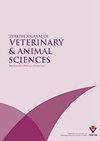Ginkgo biloba extract EGB761 improved anti-heat stress responses in chickens in vivo via regulation of heat-shock protein expression and distribution
IF 0.6
4区 农林科学
Q4 VETERINARY SCIENCES
引用次数: 0
Abstract
Heat stress is a lethal threat to chickens. This study investigated the protective effect of a Ginkgo biloba extract EGB761 against heat stress in chickens in vivo. A total of 200 one-day-old hens were separated randomly into control Con , heat stress HS , 0.1% EGB administration and heat stress 0.1% EGB+HS , 0.3% EGB administration and heat stress 0.3% EGB+HS , and 0.6% EGB administration and heat stress 0.6% EGB+HS groups. After EGB761 administration for 45 days, ten chickens were selected randomly, assigned to one of the designated groups, and exposed to a one-time heat stress condition of 38 ± 1 °C for 3 h. The results showed that EGB761 administration improved the growth performance and physiological condition of the chickens, reducing feeding-related mortality. EGB761 lowered the histological scores of the heart, liver, and duodenum in the heat-stressed chickens. EGB761 significantly reduced the transcription and translation levels of Hsp27, Hsp70, and Hsp90 in these organs. EGB761 might promote the transformation of Hsps in the heart, increase the nuclear translocation of Hsp27 and Hsp90 in hepatocytes, and regulate the accumulation of Hsp27 and Hsp70 in intestinal villi. Therefore, EGB761 administration is a potential method for protecting chickens from acute heat stress damage.银杏叶提取物EGB761通过调节热休克蛋白的表达和分布改善鸡体内的抗热应激反应
热应激对鸡是致命的威胁。本研究探讨了银杏叶提取物EGB761对鸡体内热应激的保护作用。选取200只1日龄母鸡,随机分为对照组、热应激HS组、0.1% EGB组和热应激0.1% EGB+HS组、0.3% EGB组和热应激0.3% EGB+HS组、0.6% EGB组和热应激0.6% EGB+HS组。饲喂EGB761 45 d后,随机选取10只鸡分为1组,在38±1℃的一次性热应激条件下处理3 h。结果表明,饲喂EGB761改善了鸡的生长性能和生理状况,降低了饲养相关死亡率。EGB761降低了热应激鸡的心脏、肝脏和十二指肠的组织学评分。EGB761显著降低了这些器官中Hsp27、Hsp70和Hsp90的转录和翻译水平。EGB761可能促进Hsps在心脏中的转化,增加Hsp27和Hsp90在肝细胞中的核易位,调节Hsp27和Hsp70在肠绒毛中的积累。因此,EGB761是保护鸡免受急性热应激损伤的潜在方法。
本文章由计算机程序翻译,如有差异,请以英文原文为准。
求助全文
约1分钟内获得全文
求助全文
来源期刊
CiteScore
1.30
自引率
0.00%
发文量
57
审稿时长
24 months
期刊介绍:
The Turkish Journal of Veterinary and Animal Sciences is published electronically 6 times a year by the Scientific and Technological Research Council of Turkey (TÜBİTAK).
Accepts English-language manuscripts on all aspects of veterinary medicine and animal sciences.
Contribution is open to researchers of all nationalities.
Original research articles, review articles, short communications, case reports, and letters to the editor are welcome.
Manuscripts related to economically important large and small farm animals, poultry, equine species, aquatic species, and bees, as well as companion animals such as dogs, cats, and cage birds, are particularly welcome.
Contributions related to laboratory animals are only accepted for publication with the understanding that the subject is crucial for veterinary medicine and animal science.
Manuscripts written on the subjects of basic sciences and clinical sciences related to veterinary medicine, nutrition, and nutritional diseases, as well as the breeding and husbandry of the above-mentioned animals and the hygiene and technology of food of animal origin, have priority for publication in the journal.
A manuscript suggesting that animals have been subjected to adverse, stressful, or harsh conditions or treatment will not be processed for publication unless it has been approved by an institutional animal care committee or the equivalent thereof.
The editor and the peer reviewers reserve the right to reject papers on ethical grounds when, in their opinion, the severity of experimental procedures to which animals are subjected is not justified by the scientific value or originality of the information being sought by the author(s).

 求助内容:
求助内容: 应助结果提醒方式:
应助结果提醒方式:


